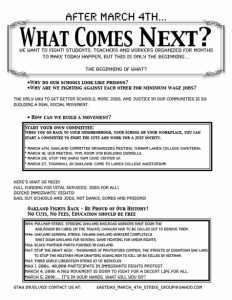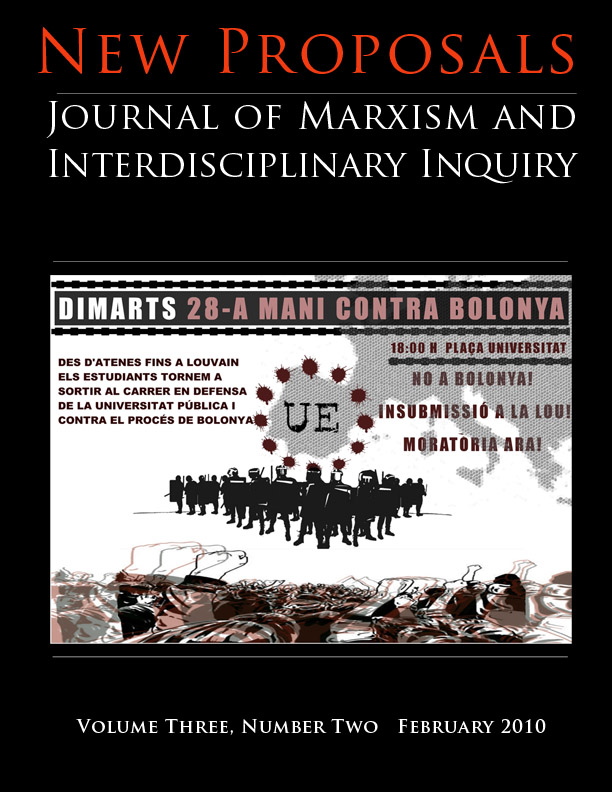March 4th is right around the corner and the local, national and international anticipation for this historic day is growing by the minute. Students, teachers, staff, parents and workers from all over California, the nation and the world have been organizing and building for the Strike and Day of Action. Below is a tentative list of events that will be happening on March 4th in California.
If you have any information to add to the list below, have information on events from places outside of California or have any questions about March 4th, please email march4strikeanddayofaction@gmail.com or visit http://defendcapubliceducation.wordpress.com/school-reports/ and tell us what is being planned in your school, workplace, community for March 4th Strike and Day of Action.
In Solidarity,
Jonathan Nunez
Follow-up committee of the October 24th Conference
Regional Events
Los Angeles Regional Rally
* 3 pm Rally @ Pershing Square (5th & Hill) in downtown L.A.
* 4 pm March from Pershing Square to the Governor’s office
* 5 pm Rally @ Governor’s office (300 Spring St.)
East Bay/Oakland Regional Rally
* 12 pm-4 pm Rally @ Frank Ogawa Plaza (in front of Oakland City Hall, 14th & Broadway)
* March to the Ogawa Plaza Rally from:
-UC Berkeley: 12 pm Rally @ Bancroft & Telegraph, followed by March
-Laney College: 11 am Rally, followed by March
-Fruitvale BART: Assemble @ 11 am, March @ 11:30 am
* Travel to San Francisco Regional Rally (See regional listing below)
San Francisco Regional Rally
* 5 pm Rally @ San Francisco Civic Center
Sacramento/State Capitol Rally
* 11 am-1 pm Rally @ State Capitol (North Steps of Capitol)
San Diego Regional Rally
* 3 pm Rally @ Balboa Park, followed by March to governor’s office
* 4 pm Rally @ Governor’s office (downtown)
San Fernando Valley Regional Rally
* 3:45 pm gathering @ CSU Northridge Sierra Quad
* 4:15 pm March
* 5 pm Hands around CSUN
* 5:30 pm Rally @ CSU Northridge Sierra Quad
Local Events
UC Berkeley
* 7 am-12 pm Pickets
* 12 pm-1 pm Rally/Action @ entrance to Sproul Plaza (Telegraph & Bancroft)
* 1 pm-3 pm March from UC Berkeley to Oakland’s Ogawa Plaza
* Students, faculty, workers and campus community will travel to San Francisco Regional Rally (See regional listing above)
UCLA
* 10 am Pickets
* 11:30 am Walk Out
* 12 pm Rally @ Bruin Plaza
(UCLA invites high schools and community colleges in the Westside area to join)
UC San Diego
* 11:30 Walk-out & Rally @ Gilman Parking Structure
* 12:30 pm March from Gilman to the Silent Tree outside Giesel Library and Rally there
* Students, faculty, workers and campus community will travel to San Diego Regional Rally (See regional listing above)
UC Santa Cruz
* 6:00 am Picket at the entrances to campus
* 9:00 am Rally @ main entrance to the campus (Bay and High)
* 12:00 pm Rally @ main entrance to the campus (Bay and High)
* 5:00 pm General Assembly @ main entrance to campus (Bay and High)
UC Riverside
* 1 pm gathering @ UCR Bell Tower
* 2:30 pm March from UCR to downtown
* 3:30 pm Rally @ University Ave and Market St. (Downtown Riverside)
CSU Bakersfield
* 11:30 am-1 pm @ the Student Union Patio (rain: Stockdale Room in Runner Café)
CSU Channel Islands
* Students, faculty, workers and campus community will travel to the San Fernando Valley to participate in San Fernando Valley Regional Rally @ CSU Northridge (See regional listing above)
CSU Chico
* 8 am sendoff for students, faculty, workers and campus community traveling to State Capital Rally (See regional listing above)
CSU Dominguez Hills
* Students, faculty, workers and campus community will travel to Wilson High School Long Beach and Los Angeles Regional Rally (See Long Beach details below or regional listing above)
* 11 am-1 pm students hold a fair on CSUDH East Walkway (Games to learn about public education costs, access and quality)
CSU East Bay
* 12 pm Rally/Open Mic/Speack Out @ Agora Stage
* Students, faculty, workers and campus community will travel to San Francisco Regional Rally (See regional listing above)
Fresno State
* 10:30 am March from NW corner of Blackstone and Shaw, go down Shaw to Fresno State
* 12 pm-1 pm Rally @ Peace Garden
CSU Fullerton
* Students, faculty, workers and campus community will travel to Los Angeles Regional Rally (See regional listing above)
Humboldt State
* 3 pm-5 pm Rally @ Humboldt County Courthouse-Eureka with CSU and K-12 faculty and students
Cal State Los Angeles
* 9:30 am Rally @ the USU area (Free Speech area)
* 2 pm March to Los Angeles Regional Rally (See regional listing above)
CSU Long Beach
* 12 pm-1 pm Rally @ South Campus, Upper Quad,
* 1 pm-2 pm Parade
* 4 pm Rally with K-12 and Community College (see below)
Long Beach: Wilson High School
* 4 pm Rally @ Wilson High School Gymnasium (4400 E. 10th St.)
* Music by Tom Morello (Rage Against the Machine, Audioslave, The Nightwatchman)
California Maritime Academy
* Students, faculty, workers and campus community will travel to San Francisco Regional Rally and Sacramento/State Capitol Rally (See regional listing above)
* 12 pm Street Theatre/Mock “Die-In” @ Maritime’s main quad
CSU Monterey Bay
* 11 am-1 pm Rally/March
* Followed by car-pools to Community Rally
* 4 pm Community Rally @ Colton Hall (570 Pacific St. between Madison & Jefferson)
– Contact: Kat General, 415-728-8927
CSU Northridge/San Fernando Valley Regional Rally
* 3:45 pm gather @ CSU Northridge Sierra Quad
* 4:15 pm March
* 5 pm Hands around CSUN
* 5:30 pm Rally @ CSU Northridge Sierra Quad
Cal Poly Pomona
* 1:30 pm- 2:30 pm Send off Rally @ – as CFA members, students and campus community board buses for Los Angeles Regional Rally (See regional listing above)
Sacramento State/Sacramento/State Capitol Rally
* 11 am-1 pm Rally @ State Capitol (North Steps of Capitol)
– Contact: Kevin Wehr, 916-541-2125
CSU San Bernardino
* 11:30 am March @ Marquee entrance (NW corner of University Pkwy and Northpark Blvd)
* 12 pm Rally @ Pfau Library
San Diego State/San Diego Regional Rally
* 11:30 am-12:00 pm collect video testimonials from students and campus community next to Aztec Center (Large “scoreboard” showing the loss of students, teachers and classes at SDSU due to budget cuts)
* 12:00 pm Rally by Aztec Center
* Students, faculty, workers and campus community will travel to San Diego Regional Rally (See regional listing above)
San Francisco Sate
* 7 am Campus Shutdown
* Students, faculty, workers and campus community will travel to San Francisco Regional Rally (See regional listing above)
San Jose State
* 11 am gather at San Jose City Hall
* 11:45 am March to San Jose State Tower Lawn (7th Street Plaza entrance)
* 12 pm Rally @ San Jose State Tower Lawn
Cal Poly San Luis Obispo
* 3:30-5 pm Rally @ Office of state Senator Abel Maldonado (1356 Marsh St., San Luis Obispo)
CSU San Marcos
* 10:30 am-11:30 am Teach-in on State Budget @ Academic Hall (ACD) 102 (simulcast to other classrooms)
* 12 pm-1 pm Rally @ Kellogg Library
Sonoma State
* 11:30 am Student Walk Out
* 12:00 pm-1:30 pm Rally near Stevenson Quad
CSU Stanislaus
* 11:30 am-1pm Rally @ campus Quad
Original list compiled by Steve Seltzer
Modified by Jonathan Nunez


